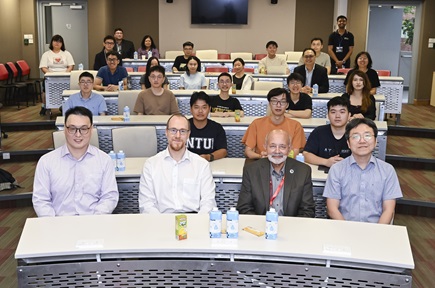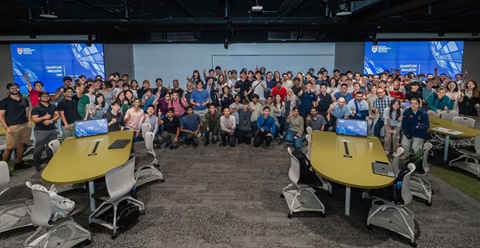Antimicrobial Resistance, Intellectual Property and Early-Stage Drug Development by Prof Thomas Dick , Dr Vladimir Marshansky & Dr Mhairi Skinner
IAS STEM Graduate Colloquium Jointly Organised with the Graduate Students’ Clubs
The IAS and the Graduate Students’ Clubs of CCEB, SBS and LKCMedicine jointly organised the STEM Graduate Colloquium featuring our three distinguished speakers, Prof Thomas Dick, Dr Vladimir Marshansky and Dr Mhairi Skinner on 31 May 2024 at SBS Classroom 1.
Prof Dick is a member at the Center for Discovery and Innovation, Hackensack Meridian Health and a professor at the Hackensack Meridian School of Medicine. With 20 years of experience in antibacterial drug discovery and R&D program management, he has authored over 200 papers in antibiotic discovery and resistance. He also established a robust drug discovery platform that includes strain collections, potency assays and pharmacology models.
In his presentation titled “Antimicrobial Resistance and Antibacterial Drug Discovery”, Prof Dick highlighted the critical role of academia in drug discovery throughout history, especially in modern times where we see the pharmaceutical industry withdrawing from it. Prof Dick further described the important qualities of drugs such as potency, exposure and tolerability; and strategies and methods for drug development. There are three strategies: de novo – making new chemical entities from scratch; re-engineering – optimisation of existing drugs to improve potency; and repurposing – using existing medications and their combinations to treat other diseases.

Prof Thomas Dick's presentation took the audience through the history of drug discovery up to present day.
The second speaker, Dr Mhairi Skinner is the Director and CSO in Neuro-Horizon Pharma Inc; a drug development company which partnered with NTU and EDDC Singapore to develop drugs against multidrug-resistant tuberculosis. In her presentation titled “Intellectual Property: How, when and whether to pursue it and its importance in protecting drug development”, Dr Skinner provided an insightful background on what intellectual property is and why it is valuable, with an emphasis on patents. She highlighted patent as a business tool that can attract investment, create commercial value, and generate revenue streams.
Dr Skinner highlighted that after preclinical trials, only 10% of drugs reach human testing, making patents crucial despite the lengthy timeline required for approval. She emphasised the importance of avoiding common mistakes such as public disclosure, insufficient disclosure, or poor intellectual property strategy. She stressed that strong patents integrate the interests of all involved parties, including researchers and investors.
 Dr Mhairi Skinner meticulously described the anatomy of patent and patentability, and the patenting process.
Dr Mhairi Skinner meticulously described the anatomy of patent and patentability, and the patenting process.
The third and final talk was presented by Dr Vladimir Marshansky, President and CEO at Neuro-Horizon Pharma Inc. His presentation titled Early-stage Drug Development: A Case Study Using An Antibacterial Drug Targeting F-ATP Synthase Nano-motor described rotary nano-motors, which first appeared 4 billion years ago. He compared these tiny engines, powered by the flow of protons, to turbines and rotors seen in hydro-electric power plants. He highlighted F-ATP synthase, located in mitochondria (and bacteria), and V-ATPase, located in organelles and endosomes. He also discussed the medical implications of targeting V-ATPase to treat neurodegenerative diseases, and targeting F-ATP synthase to treat pulmonary tuberculosis. Bacterial F-ATP synthase has a specific loop that is not present in humans, making it a potential drug target.

Dr Vladimir Marshansky explained that targeting specific enzymes can have impactful medical implications and help treat diseases.
The colloquium provided a fascinating look back at the history of antimicrobial drug discovery, highlighting significant contributions to this vital field. The speakers’ thorough overviews and insightful commentary offered a compelling narrative that celebrated past successes and ignited curiosity and enthusiasm for the boundless future possibilities in antimicrobial research and drug discovery.

Written by Andrey Vaulin | NTU School of Biological Sciences Graduate Students' Club
“The talks provided an understanding of the work being done in other labs to address antimicrobial resistance, broad based learning on Intellectual property and patents, as well as insights into clinical trials and drug development.” - Fong Tuck Choy (PhD Student, SBS)
“The sharing of background history, practical tips and explanations was useful.” - Nabilah Taqiah (Research Assistant, SCELSE)
“The session was interactive and informative.” - Meroshini (Research Associate, SBS)
Watch the video recording of Prof Thomas Dick's talk here


.tmb-listing.jpg?Culture=en&sfvrsn=c45c3c7e_1)



